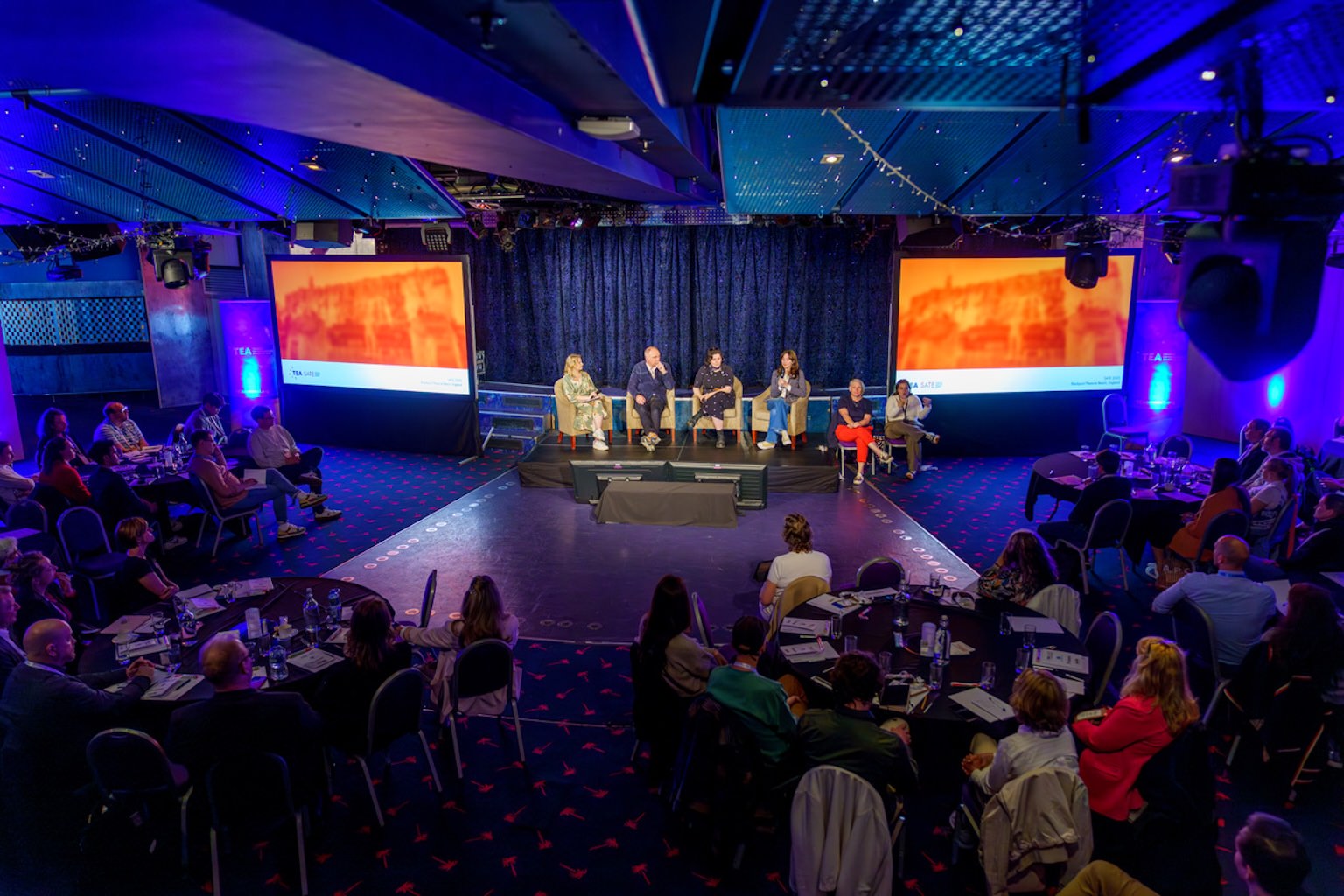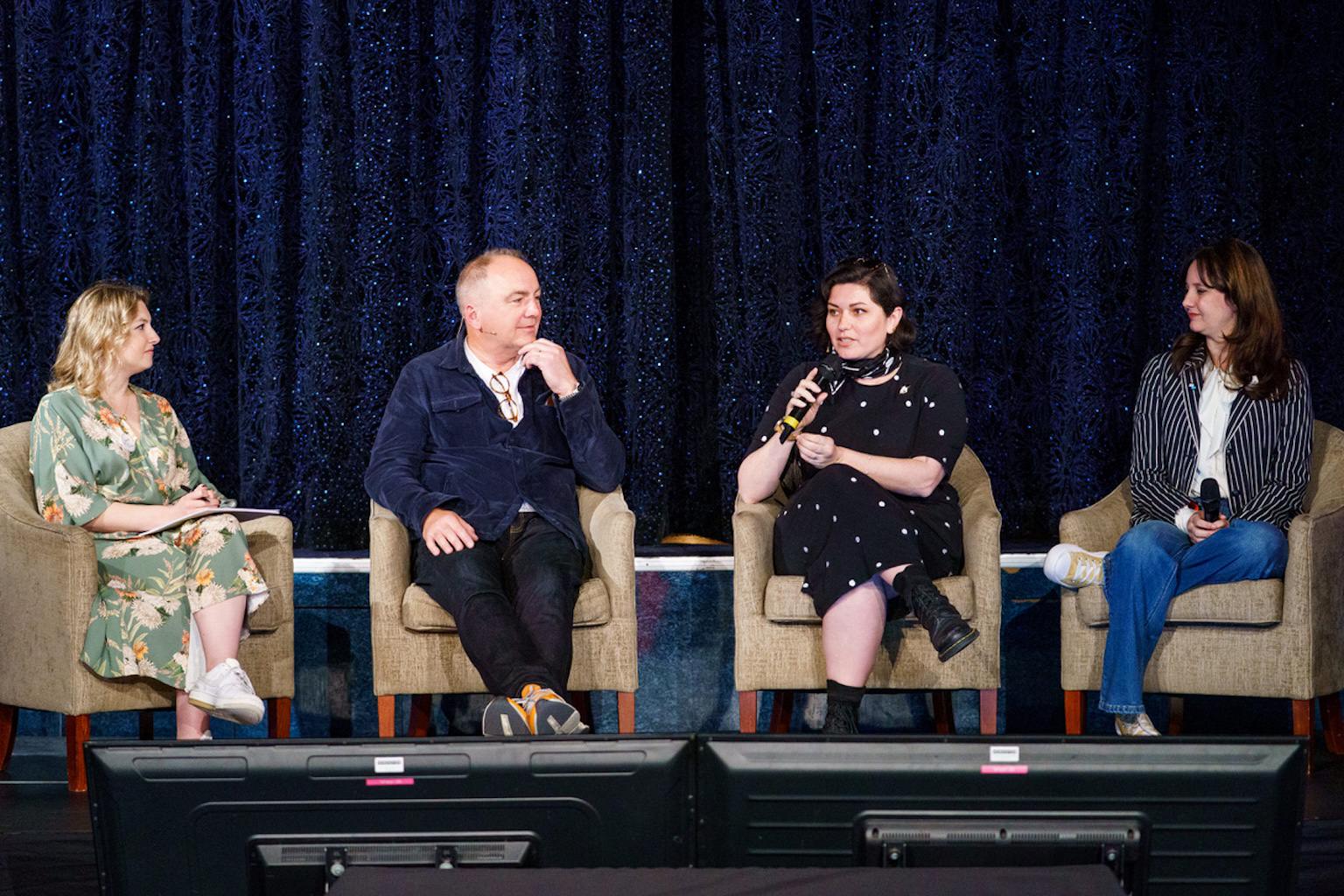Blackpool, UK
May 15, 2025
Blackpool, UK

TEA Sate is the thinking space for the Themed Entertainment Industry and stands for Storytelling, Architecture, Technology = Experience. Events are held in each of the TEA's global regions, with the theme for this year's European Event being 'Emotion', exploring how it shapes and elevates the themed entertainment industry.
We were lucky enough to be selected to speak individually and as part of a panel covering the subject of 'Playing with Emotions'. We shared the stage with Danielle Tanton of RWS Global, Morgane Kesling from Disneyland Paris and Shelby Honea of Universal Creative.
Our subject was a brief overview of our previous thought voice about Ultra Processed Play, but you can read the text we presented in full here.
We believe that children today are facing an imagination crisis.
And it's because we have entered an era of ultra processed play.
We believe there’s a genuine crisis coming down the line and our young people are not only losing their time to think and breathe, they are being deprived of their opportunities to imagine, create and develop.
Risk Matters
When we were kids, play was organic, unsupervised, unstructured and often carried a degree of risk. The only time limit was your stomach calling you home in time for tea.
The former quarry close to where I grew up, had been converted into one of the new style ‘adventure playgrounds’.
This idea had been brought to the UK by Marjorie Allen, after she saw it in action on vacant lots in US cities.
The play was completely self service, largely dangerous, always involved heavy building materials, high slides and deep stagnant water to swing across.
You had hours to allow ideas and structures to develop. If you got it wrong, there was the odd broken arm, but it was just brilliant fun.
But all of this has slowly and inexorably changed.
Why we need risk
Children are rarely exposed to risk in any form, let alone actual danger. The world is a much more closely watched place, but this absolutely isn't the same thing as it being any safer.
In many ways, the opposite is true.
Stephen Moss the TV Presenter and naturalist described a Nature Deficit Disorder back in 2012. And the Daily Mail quotes NHS figures that back this up.
Some 885 children aged 14 or under ended up in A&E after falling out of trees in 2008-09, while the figure had decreased by 33 per cent in 2018-19 to 593.
Meanwhile, hospital admissions for repetitive strain injuries – often associated with video game use – increased by 65 per cent.
Disturbingly, there was a 432 per cent increase – from 305 to 1,623 – in incidents of children injuring themselves through ‘intentional self-harm by a sharp object’. (1)
Their bedroom should be the very definition of a place of safety.
Understanding and managing risk is critical for child development. It's a life skill they cannot live without.
And we believe that it’s all of our responsibilities to shoulder some of the blame and potentially help deliver some of the cure.
We wrapped our children in cotton wool and told them they could be anything they wanted and they took it literally - forgetting they need to put the work in first to gain the skills to get there. We have created a generation of kids who have been trained to have a very short attention span.
Going back to Piagets Child Development Theory, we didn’t allow them time to complete all of the critical learnings at each stage, before they moved onto the next one.
We have to change our own mindsets first to allow us to make things better for our kids and all of our futures. We have to expand our own risk envelopes on their behalf, be prepared for some mistakes and breaks along the way and let them live a breathe freely again.
Homogenous Play
Play has gone the same way too.
It’s become an homogenous offer globally, based on research and the path of least resistance by parents, that is almost entirely risk free.
And IP based play is only adding to the problem. All of the TV the youngest in society consume is repetitive, sanitised and global in nature too. There’s no localisation and no space for imagination in the child's mind, as it's all been done for them.
Like the UPF food, It’s visual and audio crack.
Once you pop you can’t stop.
It’s delivered in tiny five minute segments, often with a moral dimension to aid repetitive learning, but it isn’t allowing space for imagination.
Much of the IP based play is passive. It's five intense minutes of sensory overload. The entertainment happens around you.
Alternatively, you walk through an area where the imagination is on show and these days, normally incredible.
For the guest, it's a had the imagination delivered to the max, rather than enabling or encouraging imaginative play with others.
It's essentially an insular or isolating experience.
In a recent article in the Financial Times, they quoted a survey from 2022. In it, they said that 80% of the 55-64 year olds played out on the street and had the freedom to explore when they were young. Compare that to today and only 25% have the same opportunities.
Why this matters
There is nothing that will hamper the growth and development of the human race more than stifling creativity in young people.
Without creativity, where will the next generation of imagineers, scientists, inventors and explorers come from? How will they be inspired to do new things, go to new places and find new ways to solve old problems?
So as an industry we have a responsibility to help the future creators create.
Their future is in our hands.

from left to right. Danielle Tanton of RWS Global, Johnny Lyle, CAP.CO, Morgane Kesling from Disneyland Paris and Shelby Honea of Universal Creative.